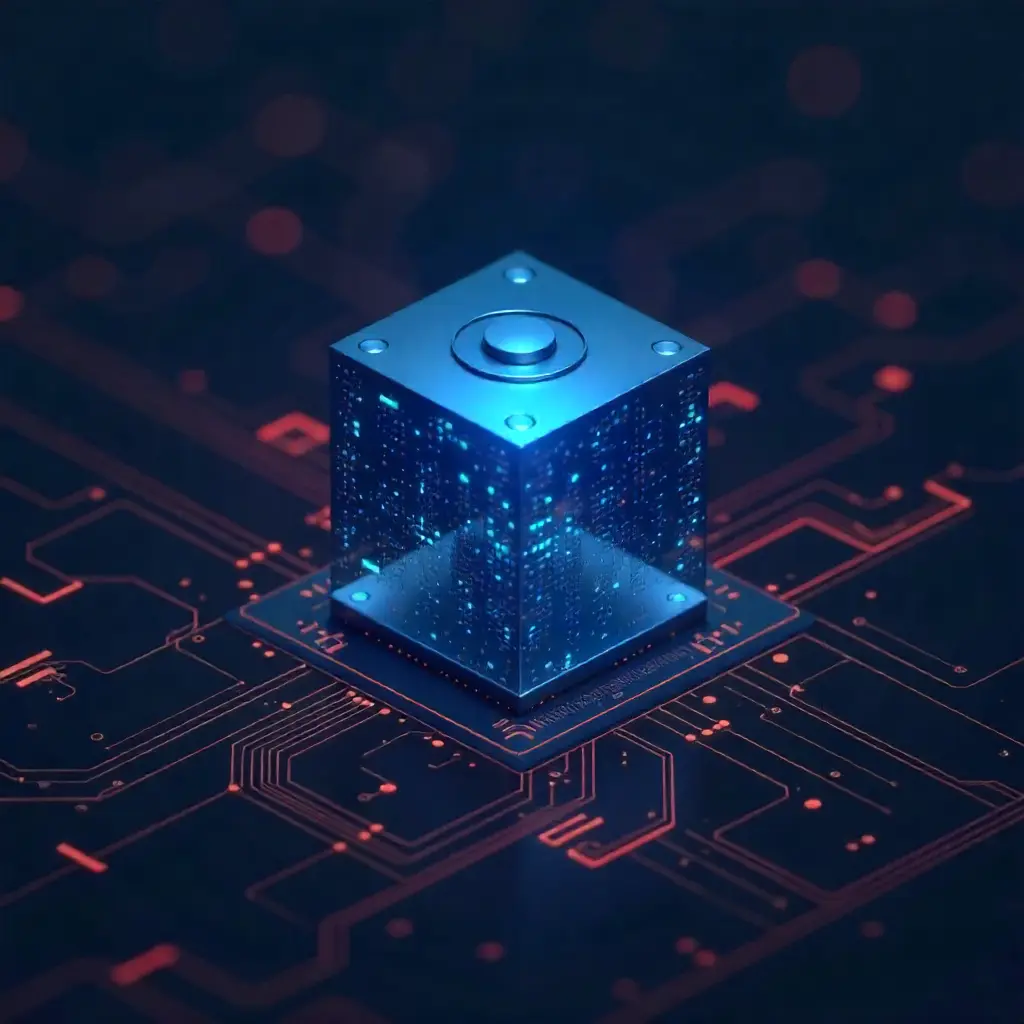Why Develop with Xode Blockchain
Blockchain At A Glance
Blockchain is a distributed ledger technology that allows data to be stored across a network of computers rather than in a single centralized server
This design ensures transparency, immutability, and security, making blockchain the backbone of Web3, cryptocurrencies, decentralized finance, NFTs, and beyond.
For Developers, blockchain is not just a database but an infrastructure for building applications that run with security, transparency, and automation without relying on intermediaries.


From Centralized to Decentralized Systems
Traditionally, applications rely on centralized servers controlled by a single entity, be it a corporation, government, or institution. This creates risks such as data breaches, censorship, downtime, and monopolization of user data.
Blockchain introduces decentralization. Instead of one authority, control is distributed across participants in the network.
This shift means developers can create applications that are censorship-resistant, fault-tolerant, trustless, and permissionless, where rules are enforced by code (smart contracts) rather than intermediaries.
Blockchain empowers developers to build apps that are secure, scalable, and future-proof while participating in a rapidly growing multi-billion-dollar industry without being constrained by platform restrictions, corporate policies, or third-party gatekeepers.
Blockchain Apps Market Opportunity
Growing Web3 industry
The Web3 industry is rapidly expanding, with billions of dollars flowing into decentralized finance (DeFi), non-fungible tokens (NFTs), gaming, and blockchain-based services.
Venture capital firms, enterprises, and governments are investing heavily in blockchain solutions.
For developers, this means building apps on blockchain isn’t just a niche hobby; it’s entering a market with strong financial backing, global reach, and long-term growth potential.
Demands for dApps
Users are increasingly seeking alternatives to traditional Web2 applications that often exploit data, impose restrictions, or lack transparency. Decentralized applications (dApps) offer solutions to these concerns by providing open, trustless, and user-owned platforms.
From DeFi lending protocols to decentralized exchanges, play-to-earn games, and digital identity solutions, the demand for dApps continues to grow.
Developers who can meet this demand with scalable, user-friendly solutions will be at the forefront of shaping the next generation of the internet.
Benefits for Developers
1. Transparency
Blockchain provides a transparent environment where every transaction, contract execution, and change in state is permanently recorded on a public ledger.
For developers, this eliminates the reliance on centralized authorities to verify data integrity. Instead, users can independently audit the system, which builds stronger trust in the applications being developed.
This transparency ensures that developers’ code operates exactly as intended and that no hidden manipulation or unfair advantage can be introduced without being visible on-chain.
2. Security
Security is one of the strongest advantages of building on blockchain. With its foundation in cryptography and consensus mechanisms, blockchain makes tampering with data nearly impossible.
For developers, this means that sensitive operations such as financial transactions or identity management are inherently more secure than in traditional systems. Rather than creating complex security measures from scratch, developers can leverage the robust protection already embedded in blockchain protocols. This not only saves development time but also gives end-users greater confidence in the safety of the application.
3. Ownership
A key benefit of blockchain is that it gives users true ownership of their assets and data. Through private keys and decentralized accounts, users are not forced to trust a single platform or institution to safeguard what belongs to them.
For developers, this creates opportunities to design applications that empower users rather than control them. In practice, this could mean giving creators ongoing royalties through smart contracts or allowing players in a game to freely trade and monetize their digital items. By enabling real ownership, developers can build applications that foster loyalty and fairness.
4. Interoperability
As the blockchain ecosystem grows, interoperability has become essential. Different blockchains can now communicate with one another, enabling the seamless transfer of assets, data, and functionality across ecosystems.
Developers benefit from this because it allows them to build applications that are not siloed to one chain, but instead can reach wider audiences and integrate with other services. This opens the door for more powerful and flexible applications, such as cross-chain DeFi platforms or multi-chain NFT marketplaces. By tapping into interoperability, developers can expand the usability and potential impact of their projects.
Economic Incentives
Tokenization
Tokenization allows developers to represent real or digital assets on-chain, turning anything from currencies and stocks to in-game items and art into tradable tokens. This creates new opportunities for monetization and innovation, as tokens can be used to incentivize behavior, grant access to services, or represent ownership.
For developers, tokenization means they can design economic models where users actively participate in value creation and exchange, enabling business models that go beyond the limitations of traditional applications
Metered System
Blockchain introduces the concept of a metered system, where usage of resources such as computation, storage, or bandwidth can be measured and priced in real time.
This is particularly valuable for developers because it allows for more efficient allocation of resources and transparent cost structures. Instead of flat fees or opaque pricing models, applications can charge based on actual usage. This not only makes systems fairer but also incentivizes efficiency and responsible use, ensuring that resources are not wasted.
Direct Global Engagement
Because blockchains are borderless by design, developers can build applications that engage users directly on a global scale. Payment settlement, data exchange, and participation in governance can happen without intermediaries, banking restrictions, or geographical limitations.
This gives developers access to an international audience from day one, while users benefit from seamless participation regardless of where they live. Direct engagement also strengthens the bond between developers and their communities, as there is no middle layer controlling access or taking a disproportionate share of the value created.
Real-World Use Cases
DeFi (Decentralized Finance)
DeFi represents one of the most transformative applications of blockchain technology. By replacing intermediaries like banks and brokers with smart contracts, DeFi allows anyone to lend, borrow, trade, and earn interest without traditional financial institutions.
For developers, this opens a playground to create innovative financial products that are accessible 24/7, globally, and with lower costs. Users benefit from transparency, permissionless access, and higher returns compared to traditional finance. DeFi protocols like decentralized exchanges, lending platforms, and stablecoins demonstrate how developers can disrupt billion-dollar industries with relatively small teams and open-source infrastructure.
Web3 Gaming
Web3 gaming combines entertainment with blockchain-enabled economies, giving players true ownership of in-game assets through NFTs and tokens. Unlike traditional games where items and currencies are locked inside a publisher’s ecosystem, Web3 games let users trade, sell, or use assets across different platforms.
For developers, this means creating experiences where community-driven economies thrive, and where gameplay can be monetized beyond one-time sales or subscriptions. This new model rewards both players and developers, fostering deeper engagement and long-term loyalty. Play-to-earn and metaverse projects are early examples of how Web3 gaming is reshaping digital entertainment.
Identity
Blockchain-powered identity solutions provide a secure and user-controlled way of managing personal data. Instead of relying on centralized databases that are prone to breaches and misuse, decentralized identity systems allow individuals to own and control their credentials.
Developers can build applications that verify identity without storing sensitive information, reducing compliance burdens and improving user trust. This has real-world implications for areas like financial onboarding, healthcare, and digital citizenship, where verifiable but privacy-preserving identity solutions are crucial.
Ramps
On- and off-ramps are critical in bridging the gap between the blockchain economy and the traditional financial system. On-ramps allow users to purchase crypto using fiat currency, while off-ramps let them convert back to cash.
Developers building in this space make blockchain accessible to mainstream users by simplifying the entry and exit process. A smooth ramping experience lowers adoption barriers, enabling applications like remittances, e-commerce, and micropayments to reach broader audiences. For developers, integrating ramps ensures that their products remain usable in real-world economies, not just within crypto-native ecosystems.
RWA
Tokenizing real-world assets such as real estate, commodities, or treasury bonds brings tangible value into blockchain ecosystems. Developers working with RWA solutions enable assets that were traditionally illiquid or difficult to access to be fractionalized and traded globally. This democratizes investment opportunities, allowing individuals to own fractions of properties, artworks, or other assets that would otherwise be out of reach.
RWAs also create stability within blockchain economies, as tokenized assets are often backed by real-world value. For developers, RWAs present a chance to blend traditional finance with blockchain, building systems that unlock entirely new markets.
Start building your decentralized apps on Xode Blockchain.
To learn more about Xode Blockchain, please visit:
- Xode Testnet: https://polkadot.js.org/apps/?rpc=wss%3A%2F%2Fpaseo-rpcnode.xode.net#/explorer
- Xode Developer Channel in Discord: https://discord.gg/V6DETUY7Cy
- Polkadot Javascript Libraries: https://polkadot.js.org/docs/
Xode DAO Github: https://github.com/Xode-DAO/xode-node
